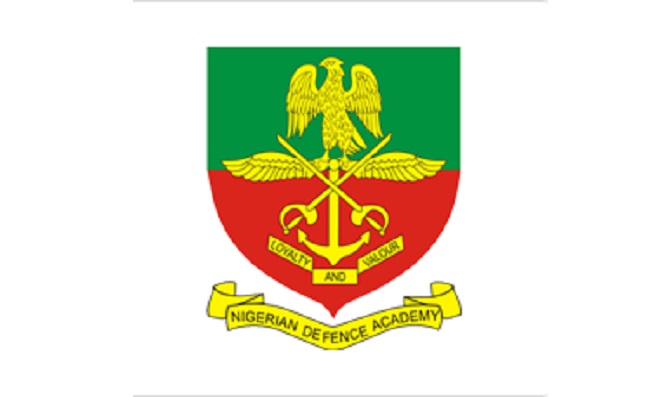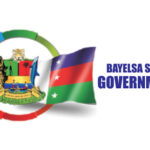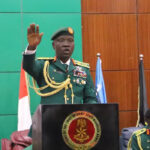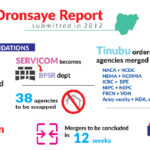On Saturday, February 10, 2024, Nigeria’s premier tri-service military training institution, the Nigerian Defence Academy (NDA), Kaduna, Kaduna State, rounded up activities marking its 60th anniversary. President Bola Tinubu, who led the array of political and military leaders to the epoch-making event, reviewed the parade and witnessed the march past by officers and presentation of colours.
The anniversary activities, which were held from Friday, February 2, to Saturday, February 10, 2024, involved other elaborate ceremonies, including the launch and unveiling of the 60th anniversary emblem and crest.
Indeed, it was a milestone worth celebrating as the NDA has remained the foremost military institution in the country where officers are trained to guard the nation’s security with resilience, discipline and commitment.
Specifically, the NDA trains the officer corps of the Nigerian Army (NA), Nigerian Navy (NN) and the Nigerian Air Force (NAF). Before independence, Nigeria’s first set of officers were trained in Ghana and subsequently in the United Kingdom. But by February 5, 1964, four years after independence, the first batch of 62 army and navy cadets commenced training in the NDA under officers mostly from the Indian Army (IA), including the first Commandant of the institution, Brigadier M R Varma.
FG begins payment of private enrolment contractors
Hardship: FG, Labour unions meet to avert nationwide protests
The NDA started as a reformation of the British-run Royal Military Forces Training College (RMFTC), which was renamed Nigerian Military Training College (NMTC) at independence in response to the defence needs of independent Nigeria to train officers for the country’s military.
The NDA started with the award of the three-year Nigerian Defence Academy Certificate of Education (NDACE) to cadets. In 1985, the academy became a full-fledged degree-awarding institution.
Now, apart from the undergraduate programmes for military officers-in-training, NDA offers postgraduate studies (MSc, MA and PhD) for both military and civilian students. In addition, it operates research centres to facilitate and enable cross-fertilisation of ideas.
The NDA, which began with an all-Indian training crew in February, 1964, completely replaced them with an all-Nigerian staff by 1978. In 1981, NDA began bilateral training of foreign military cadets.
Under its training, young officer cadets undergo a five-year (four-year academic and one-year military) Regular Combatant Course, where cadets are groomed in military, academic and character development to instill discipline and leadership skills according to global best practices, culminating in the award of a bachelor’s degree and presidential commissioning into the rank of second lieutenant for in the army and its equivalent in the navy and air force.
Until 2011, NDA used to be exclusively for men. The first set of female cadets commenced training in September, 2011. As of 2019, its total cadet class was around 2,500.
And over the years, the institution, through its military science programme, has offered cadets a balance of academic and military education which upon graduation gives them technical and leadership skills and the opportunity to become well-groomed professional officers in their chosen branch of service.
During the Nigeria-Biafra Civil War (1967-1970), NDA products helped to reshape the outcome of the war as its pioneer cadets, commissioned as NDA Course One, were sent to the war front. The officers demonstrated exceptional leadership and military skills in restoring peace and unity to the nation.
Since then the NDA has transformed into a centre of excellence for military training, educational advancement and character development, with a comprehensive curriculum packed to equip cadets with the skills and values essential for their roles as future military leaders.
A source of pride to Nigeria, NDA collaborates with international partners and participates in multinational efforts through joint training exercises, intelligence sharing and cooperation in peacekeeping missions.
Producing officers who have excelled in diplomatic roles and contributing to Nigeria’s influence on the international stage and strengthening diplomatic ties, NDA alumni have also played prominent roles in the restoration of peace and security both at home and abroad, including the fight against the Niger Delta militancy, counter-terrorism, counter-insurgency and peacekeeping operations through the ECOWAS Monitoring Group (ECOMOG) in Liberia and Sierra Leone.
Going forward, we at Daily Trust join President Tinubu in charging “the academic staff, both military and non-military to transform the NDA into ‘Nigeria’s Silicon Valley’, a hub for startups where ideas are not only incubated, but also actualised.”
Towards this, we urge the NDA to pay more emphasis on enhanced science and technology that embodies real tri-service operations and special warfare skills so that graduating cadets will be well-prepared for leadership responsibilities in single and tri- service environments.
It is important that the esprit de corps developed during training should continually lead to enhanced cooperation and performance in joint operations as the officers would have known one another.
Most importantly, the academic branch should intensify its research and development on issues peculiar to the nation’s circumstances as the institution continues to enjoy the right leadership and resources.
And to ensure that future gains of NDA are maintained and improved upon, a proper admission process devoid of corruption and influence peddling should be strictly adhered to. After all, the military is a voluntary service that should admit the best. It must never become the dumping ground of the elite and most-connected.
In addition, we call upon the NDA to improve upon its training in civil-military relations.
Happy anniversary!

 Join Daily Trust WhatsApp Community For Quick Access To News and Happenings Around You.
Join Daily Trust WhatsApp Community For Quick Access To News and Happenings Around You.


